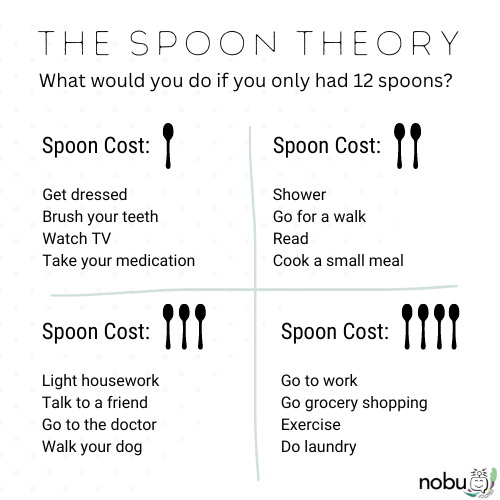The Spoon Theory and Mental Health
Table of Contents

Abby Doty has written and edited creative and literary work as well as academic pieces focused primarily on psychology and mental health.

Taylor Cameron is a Licensed Professional Counselor and mental health copywriter.

Dr. Angela Phillips is a licensed therapist and clinical researcher.
Latest Blog Posts

Download The Nobu App
- January 11, 2023
Table of Contents
Can a metaphor help you share your experience with mental and chronic illness as well as navigate daily tasks? The spoon theory says yes.
“You don’t look sick.”
“Why are you so tired?”
“Why can’t you do this?”
If you live with chronic pain or an invisible illness, you’ve likely heard one of these statements directed at you. It’s difficult to explain the impact of your illness when others can’t see it. Tasks that others may deem simple can feel exhausting and require a lot of energy. Fortunately, spoon theory provides a way to set boundaries, care for yourself and articulate what it’s like to live with a chronic condition.
What Is The Spoon Theory?
Christine Miserandino created spoon theory as a way to describe to her friend what it’s like living with lupus. The theory outlines that individuals with chronic illnesses and pain have a limited amount of physical and mental energy to get through each day. Spoons represent a person’s energy and capacity to complete tasks. As a person with chronic illness or pain, you have a limited number of daily spoons. Each task takes a certain amount of spoons. Showering and fixing a meal may use one spoon each. Grocery shopping and working take several more of the spoons. Taking care of your kids or cleaning may use another round of spoons.
When you’ve used all your spoons for the day, your body is at capacity and needs rest. If you keep going, you’re borrowing tomorrow’s spoons and will deal with more fatigue and pain and fewer spoons tomorrow. This theory provides a visual to help you decide how to use your spoons (energy) each day. If you know you have a large project to complete, you may limit the number of spoons you use in the morning before work.

What Is a “Spoonie”?
Any person with chronic pain or illness can identify as a spoonie. These folks may experience rheumatoid arthritis, chronic back pain, migraines, fibromyalgia or mental health conditions. There isn’t one specific condition that makes someone a spoonie.
Spoonies understand that they have a limited amount of daily energy. They try to conserve and divide their spoons throughout the day. They are often part of online communities that provide robust support to members.
Spoon Theory’s Place in Anxiety and Depression
Anxiety and depression fall under the spoon theory. Severe symptoms associated with these conditions can be debilitating and impair daily functioning. Getting out of bed and starting your day may require a large amount of mental and physical energy. Common symptoms such as fatigue, sleep disturbances, brain fog and pain can leave you with limited energy.
The mental and emotional symptoms of anxiety and depression can also exhaust you. It’s not surprising that individuals with chronic illnesses are at a higher risk for depression, and those with depression are at a higher risk of developing chronic illnesses. Physical and mental health are deeply interconnected.
Some days, you may have fewer spoons to use than others. You can use this theory to help inform your boundaries and self-care in a way that helps your mental health. Are there things in your control you can do to conserve or replenish your spoons? This might look like taking a nap, eating nutritious food, taking your medicine, going to bed earlier, spending time with a loved one or saying no to requests from others.
Using the Spoon Theory To Communicate
Other people often don’t understand what it’s like to live with a chronic condition. They don’t see how pain or illness impacts every area of your life and saps your energy. It doesn’t make sense to them why you may need a nap after getting ready for the day.
Spoonies find this theory empowers them to share their experience living with a chronic illness. It helps them explain that energy is a limited resource and that daily tasks require more effort.
Learning More About the Spoonie Community
Chronic illness can be extremely isolating. When you struggle to make it through each day, it may not be possible to exert energy to go out to see friends. People who suffer from chronic conditions have found connection, validation and support from other spoonies. You’ll find online spoonie communities across social media platforms. You can search for group pages or use hashtags such as #spooniecommunity, #spoonie or #spoonielife. The great thing about online communities is that you don’t have to use spoons to get ready, travel or leave home to connect with others.
Within these groups, you’ll find spoonies sharing resources and information. But most importantly, you’ll discover a vast community of people providing support and reducing the isolation of chronic illness.
If you or a loved one are searching for support in navigating depression or anxiety, try the Nobu app. You’ll find free resources, guided video lessons and more. For an additional fee, you can connect with a licensed mental health professional. Download the Nobu app today.

Abby Doty has written and edited creative and literary work as well as academic pieces focused primarily on psychology and mental health.

Taylor Cameron is a Licensed Professional Counselor and mental health copywriter.
Read more.

Dr. Angela Phillips is a licensed therapist and clinical researcher.
- Cleveland Clinic. “What Is the Spoon Theory Metaphor for Chronic Illness?” November 16, 2021. Accessed November 29, 2022.
- National Institute of Mental Health. “Chronic Illness and Mental Health: Recognizing and Treating Depression.” 2021. Accessed November 29, 2022.
Latest Posts

